
|
May 18, 2011 - No. 83 Quebec's Anti-Worker Bill 11 Charest Government Legislates AbitibiBowater's Monopoly Right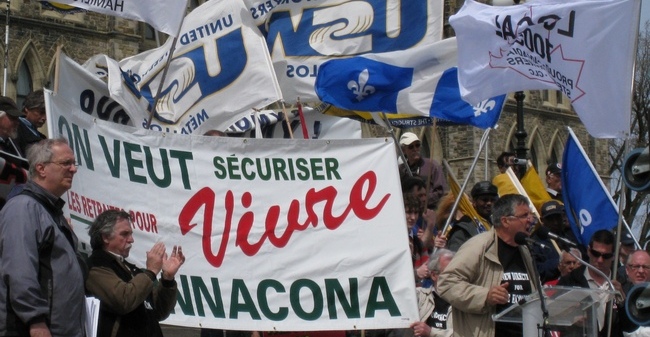 Gilles Papillon, spokesperson for the AbitibiBowater Retirees Association of Donnacona addresses rally on Parliament Hill, May 1, 2011. Banner reads "We want to secure our pensions so as to live in Donnacona." Quebec's Anti-Worker Bill 11 Quebec's Anti-Worker Bill 11 Charest Government Legislates AbitibiBowater's Monopoly RightBill 11 of the Quebec National Assembly denies public right to say no to AbitibiBowater's scheme to evade its pension responsibilities. The neoliberal Bill 11, which is now being eyed hungrily by other monopolies, gives retired AbitibiBowater workers a choice between two anti-social options: the first option is to withdraw from their defined-benefit plan and transfer to the government's Régie des rentes at a loss of over 25 per cent of their benefits; the second choice is to stay with the AbitibiBowater pension plan without any guarantee that it will ever be fully funded or will even survive beyond the next few years.
Bill 11 extends the time before AbitibiBowater must fully fund the pension plan from five to fifteen years, which is presently underfunded by 30 per cent. Bill 11 gives no guarantee that AbitibiBowater will ever fully fund the plan or that it will not declare bankruptcy and fold up the plan in worse shape than it is today leaving retirees with even less benefits than with the Régie des rentes. Bill 11 makes no demands on how AbitibiBowater uses the revenue it receives, such as restricting claims of shareholders, debt holders or executive managers or where it invests. The law provides no mechanism to guarantee AbitibiBowater will use its revenue to replenish the pension fund or on the contrary in the near future dissolve it completely under bankruptcy protection. With this government abdication of social responsibility and capitulation to monopoly right, workers and their organizations are left with no means to guarantee the pension fund or viability of the mills. Those politicians and others who say that no alternative to this neoliberal law is possible are behaving in a completely irresponsible manner and acting against public right and the Quebec nation. It must not pass. A pro-social solution is possible. A coalition of AbitibiBowater retirees has denounced this law as unconscionable and a capitulation to monopoly right. Their members warn that this law is set to expand to other monopolies and sectors spelling the death of defined-benefit pension plans in Quebec and causing turmoil in the lives of hundreds of thousands of retirees and potential retirees. The Necessity for a New Direction for the EconomyAbitibiBowater retirees have every reason to worry that the company will withhold payments into the pension fund and possibly use another crisis, bankruptcy protection and anti-social restructuring to negate its social responsibility and destroy the plan altogether. An excerpt from a recent interview conducted by financial commentator Diane Bérard with current CEO Richard Garneau shows how cavalier the monopoly is towards its social responsibilities and the economy in general: Diane Bérard: In forty years in this industry, how many times have you lived through these cycles? Richard Garneau: [laughing] I don't know anymore. But they've been getting shorter and shorter! I'm under the impression that it's three to four years. And in the last 10 years, after each downturn, we restart at a lower level than before... DB: Is there another plan for cutbacks expected? RG: I don't like the expression "cutbacks." I prefer "optimization plan." [smiles] DB: Whatever the expression, the result is the same: "cuts." [smiles] Garneau speaks casually of crises every three to four years and the real possibility of another restructuring yet the government gives the monopoly 15 years to make the pension plan whole! The Charest government and advocates of Bill 11 are not serious about this matter. The law is a carte blanche for AbitibiBowater and other monopolies to exercise monopoly right and deny their social responsibilities to their retirees. The government cannot allow AbitibiBowater to threaten a closure of the rest of its mills as blackmail to extort the passing of such a neoliberal law. Workers cannot accept this state of affairs. Both monopolies and governments must be held to account for their actions and lack of social responsibility. To give monopoly right free rein is a disaster for the people. Public right demands an accounting and the affirmation of social responsibility on pensions and other matters concerning the rights of people and their economy. CEO Garneau never opens his mouth without speaking of making AbitibiBowater mills competitive even with each other. He admits without compunction that such a direction for the forest economy is a disaster ending in chaos every three or four years, turning workers' lives and entire communities upside down. This does not include the constant shutdowns of mills even during so-called stable periods. The certainty of economic mayhem and anti-social restructuring every few years may suit certain investors, well-paid executives and neoliberal politicians but certainly not the actual producers, retirees and forestry communities that depend on the forest economy for their livelihoods and security. How can the government and others in good conscience recommend Bill 11 and the status quo of monopoly right in the face of such an uncertain situation? The unsustainable current reality demands a pro-social alternative where public right trumps monopoly right and the active and retired actual producers have control over their lives and a say in political and economic affairs. The recurring crises and incapacity of the monopolies to find a way out of the morass without attacking the people demand a new direction for the economy where priority is given to the rights of the actual producers, their communities and their treasured means of production and forest resources. To guarantee pension and other rights and a new direction for the economy requires workers take up practical politics to force governments to uphold public right not monopoly right. Together let us oppose Bill 11, support the AbitibiBowater retirees and end attempts to deprive the workers and society of an alternative to the neoliberal anti-social offensive. Say no to monopoly right and yes to public right! (Translation of interview from French original by TML Daily) Retiree Coalition Rejects AbitibiBowater BillThe coalition des retraités d'AbitibiBowater de Clermont, de Donnacona and the Association des Retraités d’Abitibi-Consol (ARAC) condemn Bill 11, tabled on May 10 in the National Assembly by the Minister of Employment and Social Security, Julie Boulet. "The Minster never met with us despite our many requests. It is an appalling lack of respect for us retired workers whose pension funds are at stake. Ms. Boulet's bill clearly permits corporations to defer payments into pension funds," says spokesman for the Donnacona retirees, Gilles Papillon. "It's simply immoral that we have been left out of this discussion. The Minister knew very well that we wanted to see her. With her usual coldness, the Minister has seen fit to protect the interests of big companies, which of course, trump those of retired workers," said Mathias Dufour, spokesman for the Clermont retirees in Charlevoix. "While this law affects only retired workers in the forestry sector, Article 1 opens the door for all the other industries to act in the same manner as AbitibiBowater is doing at our expense," Mr. Papillon warned. The members of the coalition will soon meet to adopt an action plan to increase the AbitibiBowater retirees' awareness of their rights with respect to Bill 11. "We are not finished yet," Mathias Dufour promised. The Fédération des associations de retraités du Québec (FARQ) and the Fédération de l'Âge d'Or du Québec (FADOQ) have supported the retirees from the beginning of their efforts to secure their pension funds. Information: Gilles Papillon Armand Gauthier Mathias Dufour (Translated from French original by TML Daily) Communiqué in Support of RetireesThe Réseau FADOQ and the Fédération des Associations de Retraités du Québec (FARQ) are offering their support to the Coalition des retraités d'AbitibiBowater in their initiative to denounce the abuse of Bill 11. This bill, introduced on May 10, 2011 by the Minister of Employment and Social Solidarity will allow some employers to escape their obligation to repay the deficits of the pension funds in 5 years, which the bill on supplemental pension plans currently promises. This new bill will relieve employers of their responsibility in this regard and transfer the economic risk to the workers and retirees, whose pensions will be severely reduced. Remember that the retirement pension is a deferred salary and is the result of a contract between employer and employee. It is a right and not a privilege. "The very regrettable thing is that we have repeatedly asked the Quebec government to listen to the point of view of retirees before introducing the bill. [They] have completely violated [retirees'] rights in the interests of employers," says Jean-Claude Grondin, President of the Réseau FADOQ. This bill is not only limited to AbitibiBowater retirees. It is all retirees as well as future retirees from the pulp and paper industry that will be affected by this new legislation. "Over the last few years, bills that ignore the very foundations on which we have designed the pension funds have been passed and have always given more weight to the employer to the detriment of [the workers]," emphasizes M. Jacques Beaudoin of the FARQ. Bill 11 once again demonstrates that the legislation on Quebec pension plans is a slippery slope. When will the government prioritize individuals rather than large businesses, retirees in Quebec are wondering. The Réseau FADOQ and the FARQ reiterate their support to all the current and future retirees of AbitibiBowater and plan to accompany them through this process. * The Réseau FADOQ is made up of affiliated organizations. Its mission is to bring together people aged 50 and over and represent them in matters where their rights and needs are concerned. It also organizes activities and offers programs and services that respond to their needs. The Réseau FADOQ currently has more than 260,000 members. A Shared Struggle to Safeguard Pension FundsOn May 1, 2011 on Parliament Hill many workers and retirees pledged to fight together to give a new direction to the economy. More than 2,000 workers and retirees responded to the call of USW Local 1005 from Hamilton. Why join with the workers of the steelworkers union? These workers and retirees are experiencing the same problem as the AbitibiBowater retirees. Regardless of one's province, the companies want to destroy the pensions of retirees. Retired workers from Fraser Papers in New Brunswick, AbitibiBowater in Quebec and Stelco in Ontario are all in the same fight to save their pension funds. It is immoral that our governments permit companies to stretch out debt repayment to the underfunded pension funds over a period of 15 years or more when normally it must be done within 5 years.
A worker's pension is a contract signed with the employer to ensure a full and vibrant life after 35 to 40 years of work. The pension is a deferred salary which is owed to the retiree. May 1 was an opportunity to have our voices heard by our governments. One day we will have governments that understand that they are elected by citizens, not companies. Our elected officials are amongst the people for 30 to 40 days during elections, promising them heaven and earth. With the elections over, our dear elected officials become ghosts and passing breezes who quickly make friends with the multinationals which dictate policies that favour themselves while the workers and retirees are forgotten. Normally, society is based on its citizens and we have not finished having our voices heard. Today's retirees are and will continue to be the collective wealth of society. Elected officials must always respect this, not just during an election. To conclude, the Donnacona retirees were warmly received
in Ottawa on May 1. The fight waged by the retirees of Donnacona,
Quebec, New Brunswick and Ontario must not be for one day only but all
year long. (Originally published in Le Soleil. Translated from original French by TML Daily) For Your Information Letter to Member of National Assembly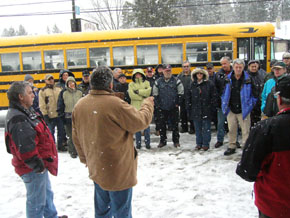  AbitibiBowater retirees from Donnacona deliver a letter to the office of the Liberal Member of the National Assembly for Portneuf Michel Matte, March 16, 2011. Mr. Matte, it should be well understood ... That you were elected to represent the citizens of the riding of Portneuf, and not to have us swallow the policies of the Liberal Party, which only benefit the big multinationals. Since November 2010, the retirees of AbitibiBowater in Donnacona have been trying to understand the agreement between the Régie des rentes du Québec and AbitibiBowater which poses serious questions for retirees. Had it not been for the last minute intervention by Mr. François Rebello, a PQ MNA, Bill 129 would have been voted on without consultation with the retirees. Following his intervention, the bill was voted on last December after the removal of Article 7 [pertaining to the pulp and paper industry -- TML Ed. Note]. Since then, Minister of Employment and Social Solidarity Julie Boulet reported in the spring of 2011 the adoption of a regulation concerning the agreement with the AbitibiBowater paper mill. In a letter signed by Mr. Roland Villeneuve on December 23, the minister mentioned that we would have the opportunity to be heard since the consultations will be held after the bill is first introduced. Mr. Matte, you can keep hammering the point and swear to us that this is the best agreement. However, we find nothing for the retirees. The only signatory to this agreement who comes out a winner is AbitibiBowater. A semblance of choice is given to retirees, namely, to risk remaining with AbitibiBowater without any guarantee or else to defer to the Régie des rents du Québec with a loss of about 25 per cent to pensions starting now. That's a nice gift to AbitibiBowater of about $1.3 billion. Mr. Matte, is this normal, that an extension of 15 years is given to AbitibiBowater to repay its debt [to the pension fund], without any guarantee? It is our money, our pensions. If it was you, would you accept this? The retirees signed a contract at the time they chose to take their retirement. Don't they have the right to demand that their pension fund be 100 per cent insured? Don't they have the right to speak to this agreement? Mr. Matte, you say that the AbitibiBowater pensioners should bet on the recovery plan. How do you explain that the government, in the meantime, finds it too risky to guarantee our pension funds? It's easy, Mr. Matte, to play with others' money. Furthermore, you are now telling us, the pensioners, that we should take this risk. The retirees are participating in the restructuring of AbitibiBowater, without having a say, without being consulted and without being involved. We have been ignored at every step. Why should the retirees be obligated to pay into their pension fund and bet on the restructuring of a multinational, which, from the moment it exited CCAA, gave generous bonuses to its executives? Why haven't you denounced these bonuses? How can we be assured that the profits will go to pay the debt the multinational owes on the pension fund? There is not a single measure in the bill to secure the pension fund. The retirees are not begging: it is their money and they have the right to enjoy their retirement free from stress. To secure the pension fund for the years to come does not mean giving up the agreement between AbitibiBowater and the Régie des rentes de Québec. We are aware that the company's survival should not be put in danger. The well-being of the retirees must be ensured through strict monitoring that will also benefit the profitability of the company. The retirees must be assured that the wealth accumulated in the pension fund will be maintained for the common good of retirees and future retirees. Mr. Matte, the Public Policy Research Institute (IRPP) confirms the AbitibiBowater retirees' misgivings about the nest egg which is owed to them. Pension plans, like that of AbitibiBowater, pose very questionable risks for their beneficiaries. Mr. Matte, you have come to the defence of this agreement without having prior discussion with the retirees affected by it. You should know that the protest movement started by the Donnacona retirees has received the support of the overwhelming majority of the population. The Fédération de l'Âge d'Or du Québec (FADOQ) and the Fédération des associations de retraités du Québec (FARQ) believes that the holding of a public consultation is urgently needed so as to ensure the rights of those retirees affected by Bill 129. It is unacceptable that the attacks on rights made by these bills will then be imposed on the entire population. Mr. Matte, you should know that this agreement is going to snowball. Even those companies which have not gone CCAA are undertaking discussions with the government so as to receive the same favours as AbitibiBowater. If such agreements become widespread, all the pension funds will be weakened and undercapitalized for a long time to come. Is this what you wish for your constituents? A strong signal must be sent to the government. It must respect retirees and future retirees. Everyone, those elected and the electors, must be partners in this step. Mr. Matte, the retirees of AbitibiBowater, who are also your constituents, call on you to take a stand with us, to see that justice is done. We also call on you to do the job for which you were elected, to defend the interests of the citizens of Portneuf. AbitibiBowater Retirees in
Donnacona (Originally published in La Presse. Translated from original French by TML Daily.) Haitian Flag Day Long Live the Struggle of the Haitian People for Complete Emancipation! Long Live Haiti!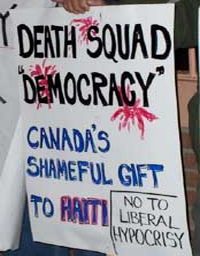 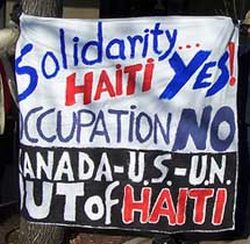  May 18 marks the 208th anniversary of Haitian Flag Day. On this occasion, TML salutes the heroic people of Haiti who freed themselves from slavery and established their republic with the world's first constitution that declared citizenship rights on the grounds of being human, not on the basis of ownership of property. Today, the people of Haiti once again pledge to rid themselves of the parasites who have enslaved them all over again in order to make superprofits from their very hides, as in days of old. This year, the celebration of Flag Day takes place in the context of the May 14 takeover of the government by U.S.-backed Michel Martelly, whose presidency was inaugurated half a year after the first round of the presidential election in November 2010. His "victory" came only after intervention by the Organization of American States and the U.S., and various other irregularities to ensure he would prevail. Martelly has nominated as his prime minister Daniel Gérard Rouzier, a fellow supporter of the 2004 coup and a neoliberal businessman. News reports also state that amongst his plans is reviving the Haitian Armed Forces which were demobilized by Jean-Bertrand Aristide in 1995. While officially disbanded, former army members continue to train and have been implicated as part of the death squads used against the Haitian people to impose the 2004 coup against Aristide and undermine their efforts to collectively exercise control over their own affairs. These forces openly espouse the return of a Duvalier-type dictatorship. Adding to the plans to officially sanction the death squads is news that this will be done in cooperation with UN forces stationed in Haiti, which since 2004 have violently suppressed the political demands and organizations of the Haitian people. In an interview with the Toronto Star, Martelly said he met with Edmond Mulet, outgoing head of the UN Stabilization Force in Haiti (MINUSTAH), and told him "there will need to be a relationship between this [military] force we have to train ... and MINUSTAH, as their departure will definitely depend on scheduling the establishment of this force." Mulet told the Star that negotiations have begun to eventually downsize MINUSTAH and transfer its functions to a new force. In other words, Martelly's installation by the U.S. and his revival of the Haitian Armed Forces will mark a return to the times of the Duvalier regime under which inhuman crimes were committed against the people. The UN further exposed its utter shamelessness in its message to Martelly on the day of his inauguration. Among other things, the message claimed this was the first democratically held election in Haiti's history. This not only tries to whitewash the blatantly undemocratic nature of this election, but seeks to further deprive former President Aristide of any legitimacy. It is unconscionable that the UN thinks it can so blatantly manipulate the failure to establish a regime in Haiti which enjoys the consent of the governed. The UN message read in part, "[MINUSTAH] welcomes the inauguration of the 56th President of the Republic of Haiti, Mr Joseph Michel Martelly. For the first time in the history of Haiti, a democratically elected President, in the person of the outgoing President René Préval has passed the reins of power to a democratically elected president, coming from the opposition." Besides overlooking the undemocratic manner in which Martelly has come to power, the MINUSTAH statement self-servingly omits that it is because of the UN enforcing the 2004 coup, rather than reversing it, that such a "democratic transition" has been waylaid. TML
condemns the collusion of the U.S., France, Canada, the UN and others
to
consolidate the death squad democracy imposed on Haiti since 2004 and
block the
people from exercising control over their own affairs. TML
expresses confidence in the revolutionary people of Haiti to defeat
these schemes and once and for all affirm their independence. Neoliberal Champion Nominated as Prime MinisterA day after his inauguration on May 14, Haitian President Michel Martelly nominated businessman Daniel Gérard Rouzier as prime minister. Thierry Mayard-Paul, the Martelly's Chief of Cabinet said the president had chosen Rouzier because of his past as an accomplished entrepreneur. "His resume speaks for itself. [...] We believe that he can be very effective at managing the government," he said. Haiti Libre notes that the choice of Rouzier "will probably be the first battle between President Martelly and a Parliament where the legislators (INITE) loyal to [outgoing President René] Préval, enjoy a comfortable majority. In recent days, rumors of the choice of Daniel Rouzier, had already caused [...] tension and negative reactions from some Parliamentarians because of his lack of political experience. Sources close to the leaders of the party INITE, have indicated that the choice of Rouzier as Prime Minister had no chance to be confirmed by Parliament, as required by the Constitution..." According to the Haitian Constitution, the choice of the Prime Minister is made in consultation with the presidents of both chambers (Deputies and Senators) in cases where the party of the President of the Republic does not have a majority in parliament. This scenario applies to the present situation where Martelly's party "Respons Peyizan" has only 3 seats in the lower house and none in the Senate. Meanwhile, in the days before Martelly's inauguration, Kim Ives, writing for Haiti Liberté, reported on Rouzier's expected nomination by Martelly based on his reputation as a champion of neoliberalism. Ives writes: "Like President-elect Martelly, Rouzier is an arch-conservative, a supporter of the 2004 coup d'état against former President Jean-Bertrand Aristide, and a devotee of neoliberal economics. "Rouzier is a classic example of Haiti's comprador bourgeoisie as the founder and general manager of Sun Auto, Haiti's largest car dealership. "In addition he is the chairman of E-Power, an independent 30 megawatt electrical power plant launched in January in the Bois Neuf area of Cité Soleil. The $59.5 million plant, largely financed by the World Bank's International Finance Corporation (IFC), runs on Heavy Fuel Oil diesel, which is less expensive than the Light Fuel Oil diesel that powers the nearby Varreux power station belonging to the state-owned Electricité d'Haïti (EDH). "Rouzier is also vice-president of the Haitian chapter of Christian behemoth Food for the Poor, the third largest international relief and development charity in the U.S., and the author of two books: Vision ou Illusion (2000) and Le Pouvoir des Idées (2002). "He also sits on the board of the Haitian investment bank PromoCapital and the Haitian Finance Company for Development (SOFIHDES) as well as the American Chamber of Commerce in Haiti. "An ostensibly deeply religious Catholic, Rouzier sponsored a Haitian bishop and an American priest to bless the unmarked mass-grave sites of some 2,500 Haitian earthquake victims dumped near Titayen, just north of the capital, Port-au-Prince. "'I was just appalled,' Rouzier said according to a YouTube video he helped produce about his efforts. "This was sacrilege." The video says that he turned his Sun Auto body shop into a foundry to make steel crosses for the earthquake dead. "'He's very conservative,' says Bobby Duval, who runs a celebrated soccer training camp for kids from Haiti's slums. "He's definitely right-wing, but very smart rightwing. Those are the more dangerous." "Daniel Rouzier, who was educated at Dartmouth and Georgetown universities in the States, is the son of Gérard Raoul Rouzier, the Minister of Sports for dictator Jean-Claude Duvalier in the 1970s. 'We used to call his father Ayatollah Rouzier,' said Duval, a former soccer star who spent almost a year and a half in one of Duvalier's most infamous prisons, Fort Dimanche. "An inkling of Rouzier's political bent can be gleaned from an article he wrote in March 2004 for The Nassau Institute, a Bahamas-based Milton Friedman-inspired think-tank 'that promotes capitalism and free markets,' according to its website. "'I have also followed the indignation and general outcry of CARICOM leaders who are mistakenly jumping to conclusions while being greatly misinformed about Haiti's situation,' Rouzier writes of CARICOM's protest against the Feb. 29, 2004 coup d'état where U.S. Special Forces kidnapped Aristide from his home and exiled him to Africa. 'Of an even greater concern to many of us is that our former president [Aristide] would come back so soon, as a CARICOM hero, to our Caribbean waters." Here Rouzier echoes the arrogant warnings issued by U.S. National Security advisor Condoleeza Rice and Defense Secretary Donald Rumsfeld that Aristide should "stay out of the hemisphere.' "In his article, Rouzier goes on to call Aristide 'one of the most violent rulers Haiti ever had,' speculating that 'his only intent seems to have only been to replace the dictators that preceded him rather than to promote real change in Haiti.' "Having supported the coup, Rouzier astonishingly writes that 'we need institutions that will enforce the rule of law,' while charging that 'Haitian demagogues (not the least being Aristide) have killed hope.' "Rouzier then lays out his vision for Haiti. 'In order for Haiti to be stable it must be prosperous and vice versa. Stability can only come through institution building. Prosperity, on the other hand, will only come with the infusion of fresh capital.' "To achieve this he lays out how the 'private sector [should] be the proponent of a development strategy' based among other things on 'establishing a free trade/free port regime with zero import tariffs' and 'privatizing public enterprises,' like EDH, which is now E-Power's main competitor and one of the last publicly-owned Haitian enterprises. "Rouzier closes by toasting the U.S., French and Canadian troops that militarily occupied Haiti right after the 2004 coup. 'U.S. forces have landed but they can no longer afford to window-dress,' he writes. 'They will have to help us consolidate our democratic institutions and establish the rule of law. The U.S., Canada, France and our other friends will need to come up with aggressive initiatives to help us attract foreign capital... Our economic policy must however remain sharply focused on the priorities defined to attract foreign investments and satisfy the criteria of the World Bank and the IMF... I am grateful for the new opportunities that we are being afforded. I believe that the French and American troops that are on Haitian soil today are different from those of 1803 [when France colonized Haiti] and 1915 [when U.S. Marines neo-colonized it]. If once again foreign troops had to come to Haiti, the problem is with us Haitians, not with them.' "It is hard to imagine a purer articulation of the Haitian bourgeoisie's subservient vision. "Nonetheless, Martelly may face a fight if Rouzier is his nominee. The Prime Minister must come from the ranks of the majority party in the Parliament. Unity, the party of outgoing President René Préval, presently holds 17 of 30 Senate seats and 46 of 99 Deputy seats. Sen. Joseph Lambert, Unity's coordinator, responded to word of Rouzier's eventual nomination by saying on Radio Métropole on May 6: 'I recall for Mr. Micky who, maybe, has not mastered the different articles of the Constitution or the Constitution in its entirety that he must stop acting like an elephant in a china shop... I say to him immediately that the Parliament is not a show where one does just anything.' "This stand-off is the principal reason why Martelly, along with the U.S. and its proxies in the OAS and CARICOM, are calling for a review of 17 Deputy races and two Senate races. As we go to press, the National Electoral Complaints and Challenges Bureau (BCEN) has handed down a ruling supporting the U.S. call for the 19 races to be revisited. "Rouzier clearly would be a Prime Minister who would privatize Haiti's last remaining state enterprises 'as the basis for foreign capital to start flowing into the country' and slash all tariff walls to 'establish a level playing field,' eliminate 'undue governmental control or interference,' and 'come up with aggressive initiatives to help us attract foreign capital,' as he has written. In short, he would rev up the 'American Plan' which Washington has been forcing on the Haitian people since 1986." UN Exonerates Itself of Culpability
|
 General Jean-Jacques Dessalines |
"Dessalines immediately reacted to Pétion's recommendation. He grabbed a red, white and blue flag, and with a sharp jerk, ripped the white stripe to pieces and joined the blue and red together, making the first Haitian flag, symbolizing the union of the mulattoes and the blacks against the colonialist, pro-slavery France. That is how the famous national bicolor was born between the end of February and the beginning of March 1803.
"Pétion wanted to hold a big meeting with all the
high ranking
officers where this new flag would be adopted after debate.
Pétion
finished by convincing Dessalines and his principal lieutenants, in
particular his private secretary and confidant Boisrond Tonnerre, to
hold a major meeting during May in Arcahaie.
"This meeting, known as the Congress of Arcahaie, was set for May 14 to 18, 1803; the agenda had two essential points: the establishment of a united command of the revolutionary army under the supreme authority of Jean-Jacques Dessalines, and the adoption of a flag by the indigenous army. The two principal leaders at this time, Dessalines and Pétion, jointly drew up this agenda. On May 14, 1803, military delegations flocked to Arcahaie [...]
"Dessalines was appointed general-in-chief of the insurrection army.
"The question of the new Haitian Flag came up on the last day, May 18. The new Commander General suggested the old slogan 'Live Free or Die' be replaced by 'Liberty or Death.' The debate over the proclamation of the creation of a new Haitian flag lasted a whole day. It was only in the evening that the Congress of Arcahaie definitively adopted the new Flag of Haiti. The white stripe was eliminated, while the remaining red and blue bands were attached together. The removal of the white stripe symbolizes the abolition of the White Man's control and the union of blacks and mulattoes in Haiti. The arms are composed of a palm tree surmounted by the Phrygian cap of liberty and ornamented with trophies with a banner across the bottom saying 'L'Union Fait La Force' (through Unity there is Strength).
"By this gesture, they publicly designated that this country no longer wanted to be recognized as a French territory and that the people who lived on this land preferred to be dead rather than be slaves. [...]
"Haiti's first flag was sewn by a lady named Catherine Flon at the Congress.
"The French troops were defeated during the battle of Vertieres (November 18, 1803). Their capitulation allowed the proclamation of Haiti's independence on January 1st , 1804. Haiti's new flag [was] raised proudly all over the country. [...]
"As we celebrate the Haitian Flag Day, we need to remember that our ancestors created this bicolor blue and red as a symbol of unity among all of us of Haitian descent to fight colonialism and live free forever."

Monument in Cap Hatien dedicated to those who fought in the Battle of Vertière in November 1803,
where the decisive defeat of the French led to Haiti's independence.
Website: www.cpcml.ca Email: editor@cpcml.ca


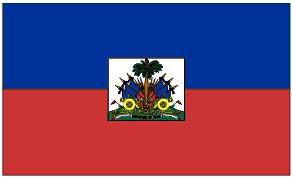 This year marks the 208th anniversary of Haitian Flag
Day, a day of significance in
the Haitian
people's struggle for emancipation and independence which continues to
this day.
This year marks the 208th anniversary of Haitian Flag
Day, a day of significance in
the Haitian
people's struggle for emancipation and independence which continues to
this day.